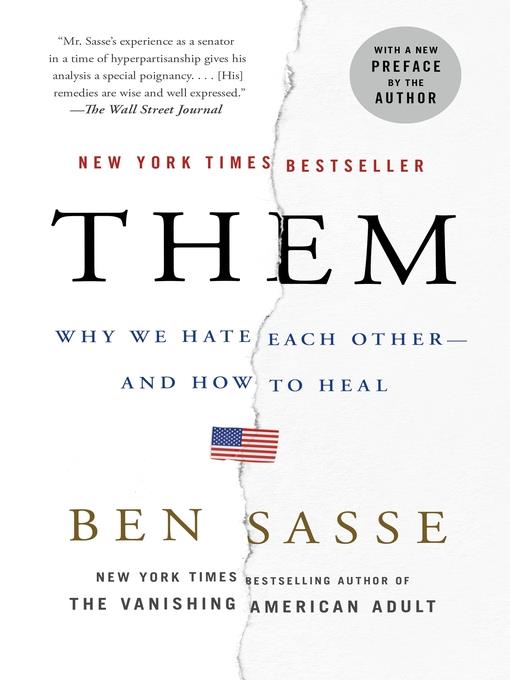
Them
Why We Hate Each Other—and How to Heal
کتاب های مرتبط
- اطلاعات
- نقد و بررسی
- دیدگاه کاربران
نقد و بررسی

September 15, 2018
The future of the republic depends on humility, empathy, and respect for pluralism.Sasse (The Vanishing American Adult, 2017, etc.), Nebraska's junior senator, lives in the same small town in which he grew up, which still evokes the "hometown-gym-on-a-Friday-night" feeling that gives him a strong sense of rootedness and community. In his impassioned critique of contemporary America, he acknowledges that the world of his childhood has changed for most people. Today's culture has become mobile, where people move from place to place and job to job: We "just don't have community cohesion like we used to." Although the author denies that he is nostalgic for the world in which he grew up, he extols the 1950s, when "work, faith, recreation, and family were bound up together"; I Love Lucy was a shared touchstone; and a close-knit community of families helped raise one another's children. Americans today, he argues, are in a dismal state: lonely, fractious, and adrift. "We are in a period of unprecedented upheaval," he writes. "Community is collapsing, anxiety is building, and we're distracting ourselves with artificial hatreds." Those hatreds are fomented by what he calls "polititainment," niche media outlets, social media, and websites--on the right and the left--that confirm biases rather than allow people to become well-informed. Sasse singles out Fox News' Sean Hannity, who hammers the message, "liberals are evil, you are a victim, and you should be furious," and he also criticizes the quashing of free speech on college campuses by those who object to "dissenters from campus majoritarian orthodoxy." Drawing on the ideas of the Founding Fathers, the author maintains that foremost among American values is the affirmation of "the dignity of our fellows." The "terrible 2016 election," he asserts, "was just a painful symptom of the bigger disease--which is our growing disinterest in the meaning of America." Sasse offers a generalized, overriding recommendation for healing: identifying and nurturing common bonds.A sensible and thoughtful yet hardly groundbreaking political analysis.
COPYRIGHT(2018) Kirkus Reviews, ALL RIGHTS RESERVED.

October 1, 2018
In this time of upheaval, we increasingly occupy ourselves with isolating technology, fake news, and angry rhetoric and distance ourselves from our neighbors and communities. U.S. Senator Sasse follows The Vanishing American Adult? (2017) with an analysis of the us-versus-them mentality that has amplified in recent years. Why do we fear and hate each other, and how can we bridge this divide? Sasse presents a compelling, well-supported look at why so many of us no longer have strong community ties and, why, in spite of all the interconnectivity in our constantly expanding, internet-driven world, so many people feel lonely. Alienation and the desire for belonging, Sasse argues, have caused us to seek like-minded people and become tribal and often angry as we unite against those we disagree with. While not completely apolitical, Sasse is careful in his disclaimers about how his beliefs shape the book, and whether readers readers agree with his political views or not, Them is a crucial contribution to a more open and productive social dialogue.(Reprinted with permission of Booklist, copyright 2018, American Library Association.)

























دیدگاه کاربران